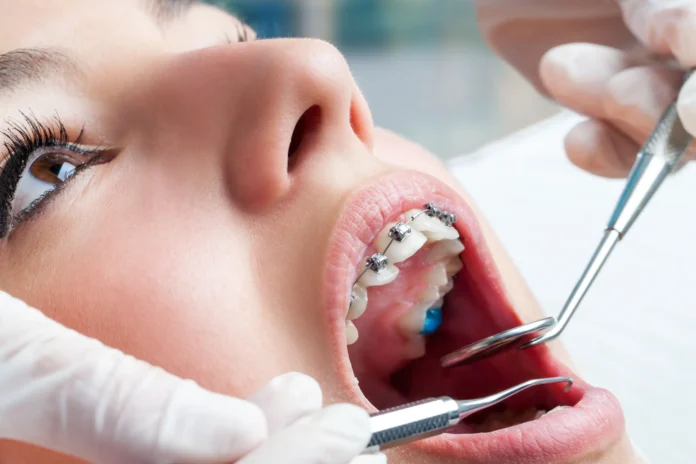Braces are a common solution for aligning teeth and creating a beautiful, healthy smile. They work gradually to adjust the position of teeth, allowing people to achieve better oral health and self-confidence. Understanding how braces straighten teeth can help people feel more comfortable with this orthodontic option.
How Braces Work to Align Teeth
Braces work through a combination of brackets, wires, and bands that apply consistent pressure to teeth over time. This pressure gradually shifts teeth into the desired position. Small brackets are attached to each tooth, while a wire runs through these brackets, connecting them. The orthodontist adjusts the wire periodically to keep the pressure effective. Over time, this pressure encourages bones around the teeth to reshape, allowing the teeth to move.
The realignment process happens slowly, which is why braces need to be worn for an extended period. By moving the teeth at a controlled pace, braces prevent damage to teeth and surrounding bones, making the treatment safe and effective.
Parts of Braces and Their Functions
Each part of braces has a specific role in guiding teeth to their proper position:
- Brackets: These small metal or ceramic pieces are attached directly to the teeth. They hold the archwire in place and help apply pressure to each tooth.
- Archwire: The archwire connects the brackets and applies force to guide teeth into alignment. It’s periodically tightened by the orthodontist to keep the teeth moving correctly.
- Bands and Ligatures: Small elastic bands, known as ligatures, hold the wire onto the brackets. They add another level of pressure to keep teeth moving in the right direction.
Each time the orthodontist makes adjustments, the braces continue to put gentle force on the teeth, gradually reshaping their alignment. This slow, steady process ensures effective movement while minimizing discomfort.
How Teeth Move with Braces
Teeth are able to move due to the unique properties of the jawbone. Though it may seem solid, the jawbone is capable of adjusting and reshaping itself in response to pressure. When braces apply pressure to teeth, the bone around the root breaks down on one side, while new bone forms on the other side. This process is called bone remodeling.
Bone remodeling happens gradually, allowing teeth to move without causing instability. Once the teeth reach their ideal position, new bone solidifies around the roots, securing the teeth in place. The skill and expertise of an orthodontist help ensure that teeth are moved safely and efficiently to achieve a balanced smile.
Why Braces Take Time
One of the most common questions about braces is why they take so long to work. Generally, braces need to be worn for one to three years, depending on the complexity of the alignment issue. Teeth move slowly to allow the bone to adjust and grow in a way that supports the new positioning. Trying to move teeth too quickly can damage the teeth or jaw, so orthodontists use gentle, consistent pressure for the best results.
Factors that impact treatment length include:
- Severity of Misalignment: Complex issues may require longer treatment periods.
- Age of the Patient: Younger patients often see faster results since their bones are still developing, making it easier to shift teeth.
- Type of Braces Used: Traditional braces, clear aligners, and other orthodontic methods work differently, which can impact the timeline.
Regular visits to the orthodontist are essential for monitoring progress and making necessary adjustments.
Benefits of Braces Beyond Straight Teeth
Straight teeth contribute to a healthier, more functional mouth. Misaligned teeth can lead to issues like uneven wear, difficulty chewing, and even jaw pain. By aligning teeth, braces can improve overall oral health, prevent potential dental problems, and enhance a person’s appearance and self-esteem.
In addition to creating an even smile, braces help with:
- Easier Cleaning: Straight teeth are easier to brush and floss, reducing the risk of cavities and gum disease.
- Better Bite: Proper alignment of the teeth improves bite function, preventing issues like overbite or underbite that can lead to jaw pain.
- Enhanced Confidence: A well-aligned smile can boost self-esteem and make people feel more comfortable in social situations.
For people in need of orthodontic care, consulting with an experienced professional is the first step toward a healthier smile. Orthodontist in Udaipur can give personalized options for achieving straight teeth.
Life with Braces: What to Expect
Living with braces requires some adjustments, but with the right care, the experience can be manageable and rewarding. Here are a few tips for making life with braces more comfortable:
- Oral Hygiene: It’s essential to maintain good oral hygiene by brushing after meals and flossing daily to prevent plaque buildup.
- Diet Adjustments: Sticky and hard foods can damage braces, so it’s best to avoid things like gum, caramel, and crunchy snacks.
- Regular Checkups: Visiting the orthodontist regularly is necessary for adjustments and to monitor progress.
While it may take time and patience, the journey to straighter teeth is worthwhile for many people. Braces remain a trusted solution for those looking to achieve a healthy, balanced smile, and with the guidance of an orthodontist, the process becomes more predictable and successful.



